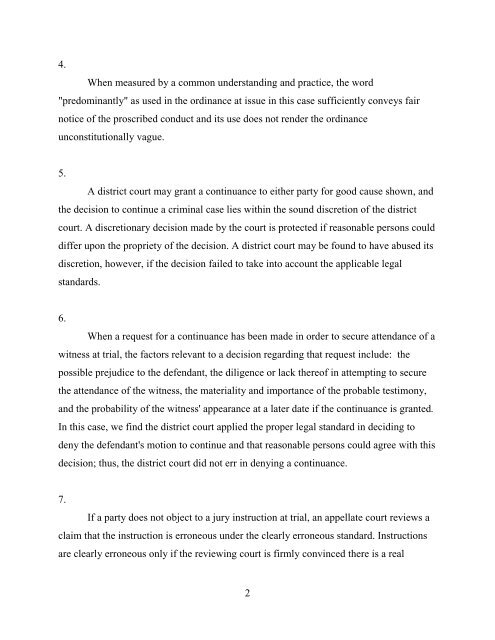Kansas Court of Appeals - 102004 â State v. Lee
Kansas Court of Appeals - 102004 â State v. Lee
Kansas Court of Appeals - 102004 â State v. Lee
You also want an ePaper? Increase the reach of your titles
YUMPU automatically turns print PDFs into web optimized ePapers that Google loves.
4.<br />
When measured by a common understanding and practice, the word<br />
"predominantly" as used in the ordinance at issue in this case sufficiently conveys fair<br />
notice <strong>of</strong> the proscribed conduct and its use does not render the ordinance<br />
unconstitutionally vague.<br />
5.<br />
A district court may grant a continuance to either party for good cause shown, and<br />
the decision to continue a criminal case lies within the sound discretion <strong>of</strong> the district<br />
court. A discretionary decision made by the court is protected if reasonable persons could<br />
differ upon the propriety <strong>of</strong> the decision. A district court may be found to have abused its<br />
discretion, however, if the decision failed to take into account the applicable legal<br />
standards.<br />
6.<br />
When a request for a continuance has been made in order to secure attendance <strong>of</strong> a<br />
witness at trial, the factors relevant to a decision regarding that request include: the<br />
possible prejudice to the defendant, the diligence or lack there<strong>of</strong> in attempting to secure<br />
the attendance <strong>of</strong> the witness, the materiality and importance <strong>of</strong> the probable testimony,<br />
and the probability <strong>of</strong> the witness' appearance at a later date if the continuance is granted.<br />
In this case, we find the district court applied the proper legal standard in deciding to<br />
deny the defendant's motion to continue and that reasonable persons could agree with this<br />
decision; thus, the district court did not err in denying a continuance.<br />
7.<br />
If a party does not object to a jury instruction at trial, an appellate court reviews a<br />
claim that the instruction is erroneous under the clearly erroneous standard. Instructions<br />
are clearly erroneous only if the reviewing court is firmly convinced there is a real<br />
2

















